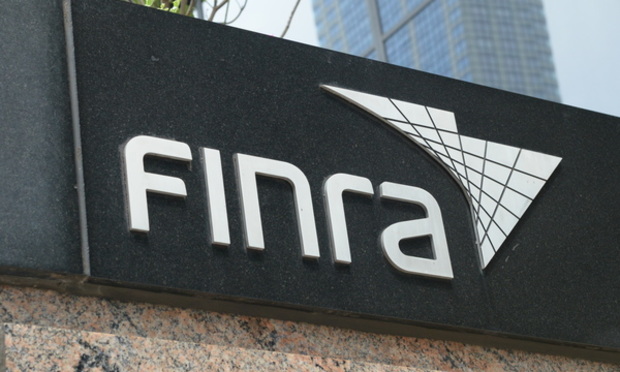11th Circuit Turns Back GOP Challenges to FINRA Contributions Rule
"The Georgia party has failed to allege that a specific member will be injured by the rule, and it certainly offers no evidence to support such an allegation," Judge Julie Carnes said.
April 27, 2018 at 05:39 PM
4 minute read

A federal appeals court dismissed challenges, albeit on procedural grounds, to a federal rule barring investment advisers or their placement agents from providing advisory services to government entities within two years of making political contributions.
The U.S. Court of Appeals for the Eleventh Circuit on Thursday turned away challenges to the Financial Industry Regulatory Authority's Rule 2030 lodged by the Georgia Republican Party, the New York Republican State Committee and the Tennessee Republican Party.
A three-judge panel of the court ruled that the Georgia Republican Party lacked standing to challenge the rule. Since Georgia's challenge should be dismissed, the Eleventh Circuit was not the proper venue for the New York and Tennessee Republican organizations, the panel added, transferring their appeals to the District of Columbia Circuit.
The organizations were challenging Rule 2030, arguing that FINRA had no authority to impose the rule and that the rule itself violated the First Amendment.
The bulk of the ruling was devoted to the Georgia Republican Party's lack of standing. It could not demonstrate, the court said, that the party itself or any of its members would suffer or had suffered injury.
“A prospective injury that is contingent on the choices of a third party is less likely to establish standing,” wrote Judge Julie Carnes for the court. Judges William Pryor and Timothy Corrigan joined in the ruling.
“Here, the Georgia party is not directly regulated by Rule 2030,” Carnes said.
The Georgia Republican Party said it had standing because its fundraising would suffer as a result of the rule, that it would have to divert resources, and its members would be harmed. It cited the U.S. Supreme Court's 2000 ruling in Friends of the Earth v. Laidlaw Environmental Services. There, the court said an association could file a lawsuit if one of its members suffered an injury.
Carnes said that ruling applied only if there was an actual injury and that the Georgia party had not demonstrated that.
“[T]he Georgia party has failed to allege that a specific member will be injured by the rule, and it certainly offers no evidence to support such an allegation,” Carnes said.
The party, citing the Eleventh Circuit's 2008 ruling in Florida State Conference of the NAACP v. Browning, said it was not required to “name names” in order to demonstrate standing. Carnes, however, said the Supreme Court in its 2009 ruling, Summers v. Earth Island Institute, largely rejected that theory.
“For reasons unknown to this court, the Georgia party has not submitted an affidavit from a member who is a placement agent regulated by Rule 2030 and who has decided not to make a particular contribution,” Carnes said.
The appeals court then turned briefly to the New York and Tennessee Republican challengers.
“Without the Georgia party, this circuit is clearly not the appropriate venue for the New York committee and the Tennessee party because neither resides or has a principal place of business within the circuit,” Carnes said.
The appeals court noted that that parties eventually agreed that the D.C. Circuit would be the more appropriate venue.
One attorney for the Republican organizations, Jason Torchinsky, offered a brief statement.
“We are disappointed in the court's decision, but we look forward to having the D.C. Circuit address the important constitutional issues presented in the case,” said Torchinsky, of the Warrenton, Virginia, office of Holtzman Vogel Josefiak Torchinsky.
Media representatives from FINRA did not respond to a request for comment.
This content has been archived. It is available through our partners, LexisNexis® and Bloomberg Law.
To view this content, please continue to their sites.
Not a Lexis Subscriber?
Subscribe Now
Not a Bloomberg Law Subscriber?
Subscribe Now
NOT FOR REPRINT
© 2025 ALM Global, LLC, All Rights Reserved. Request academic re-use from www.copyright.com. All other uses, submit a request to [email protected]. For more information visit Asset & Logo Licensing.
You Might Like
View All
Law Firms Expand Scope of Immigration Expertise Amid Blitz of Trump Orders
6 minute read
Bass Berry & Sims Relocates to Nashville Office Designed to Encourage Collaboration, Inclusion
4 minute read
Gunderson Dettmer Opens Atlanta Office With 3 Partners From Morris Manning
3 minute read
Trending Stories
- 1Uber Files RICO Suit Against Plaintiff-Side Firms Alleging Fraudulent Injury Claims
- 2The Law Firm Disrupted: Scrutinizing the Elephant More Than the Mouse
- 3Inherent Diminished Value Damages Unavailable to 3rd-Party Claimants, Court Says
- 4Pa. Defense Firm Sued by Client Over Ex-Eagles Player's $43.5M Med Mal Win
- 5Losses Mount at Morris Manning, but Departing Ex-Chair Stays Bullish About His Old Firm's Future
Who Got The Work
J. Brugh Lower of Gibbons has entered an appearance for industrial equipment supplier Devco Corporation in a pending trademark infringement lawsuit. The suit, accusing the defendant of selling knock-off Graco products, was filed Dec. 18 in New Jersey District Court by Rivkin Radler on behalf of Graco Inc. and Graco Minnesota. The case, assigned to U.S. District Judge Zahid N. Quraishi, is 3:24-cv-11294, Graco Inc. et al v. Devco Corporation.
Who Got The Work
Rebecca Maller-Stein and Kent A. Yalowitz of Arnold & Porter Kaye Scholer have entered their appearances for Hanaco Venture Capital and its executives, Lior Prosor and David Frankel, in a pending securities lawsuit. The action, filed on Dec. 24 in New York Southern District Court by Zell, Aron & Co. on behalf of Goldeneye Advisors, accuses the defendants of negligently and fraudulently managing the plaintiff's $1 million investment. The case, assigned to U.S. District Judge Vernon S. Broderick, is 1:24-cv-09918, Goldeneye Advisors, LLC v. Hanaco Venture Capital, Ltd. et al.
Who Got The Work
Attorneys from A&O Shearman has stepped in as defense counsel for Toronto-Dominion Bank and other defendants in a pending securities class action. The suit, filed Dec. 11 in New York Southern District Court by Bleichmar Fonti & Auld, accuses the defendants of concealing the bank's 'pervasive' deficiencies in regards to its compliance with the Bank Secrecy Act and the quality of its anti-money laundering controls. The case, assigned to U.S. District Judge Arun Subramanian, is 1:24-cv-09445, Gonzalez v. The Toronto-Dominion Bank et al.
Who Got The Work
Crown Castle International, a Pennsylvania company providing shared communications infrastructure, has turned to Luke D. Wolf of Gordon Rees Scully Mansukhani to fend off a pending breach-of-contract lawsuit. The court action, filed Nov. 25 in Michigan Eastern District Court by Hooper Hathaway PC on behalf of The Town Residences LLC, accuses Crown Castle of failing to transfer approximately $30,000 in utility payments from T-Mobile in breach of a roof-top lease and assignment agreement. The case, assigned to U.S. District Judge Susan K. Declercq, is 2:24-cv-13131, The Town Residences LLC v. T-Mobile US, Inc. et al.
Who Got The Work
Wilfred P. Coronato and Daniel M. Schwartz of McCarter & English have stepped in as defense counsel to Electrolux Home Products Inc. in a pending product liability lawsuit. The court action, filed Nov. 26 in New York Eastern District Court by Poulos Lopiccolo PC and Nagel Rice LLP on behalf of David Stern, alleges that the defendant's refrigerators’ drawers and shelving repeatedly break and fall apart within months after purchase. The case, assigned to U.S. District Judge Joan M. Azrack, is 2:24-cv-08204, Stern v. Electrolux Home Products, Inc.
Featured Firms
Law Offices of Gary Martin Hays & Associates, P.C.
(470) 294-1674
Law Offices of Mark E. Salomone
(857) 444-6468
Smith & Hassler
(713) 739-1250






